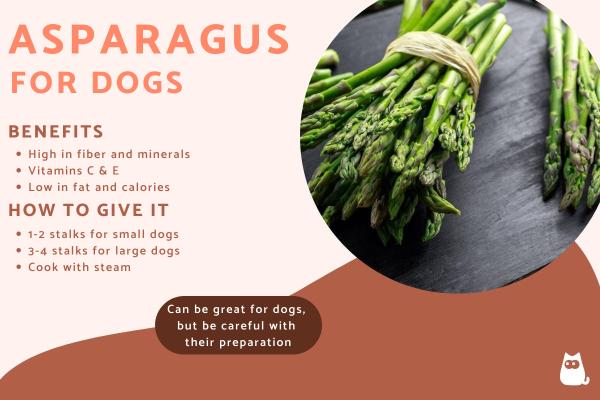Is Asparagus Good for Dogs?



See files for Dogs
Asparagus is a delicious vegetable which can be produced in two main varieties, green and white. While it is very nutritious for humans, you may ask yourself is can dogs eat asparagus? As it is not a vegetable which is toxic to canines, it is possible for a dog to eat asparagus without getting sick. However, this is not the same as whether asparagus is beneficial for dogs. This is why AnimalWised asks is asparagus good for dogs? To find out, we need to look at the nutrition asparagus provides, the nutritional needs of dogs and how dogs can best eat asparagus.
Is asparagus good for dogs?
First of all, we must remember that there are two main types of asparagus: white and green. The main difference between both varieties lies in the way they are cultivated:
- White asparagus: they are grown underground, away from the sun. This lack of sunlight prevents photosynthesis and means they are white when they are harvested.
- Green asparagus: they are left to grow naturally in the open air, which allows the process of photosynthesis to take place and the vegetable to acquire a green hue.
Despite the distinct difference in color, there is little change in terms of nutritional composition. Green asparagus is said to have more antioxidants, but they are both nutritionally well balanced. They are high in fiber and packed with vitamins C, A and particularly high levels of vitamin K. They are low in carbohydrates and calories. You can also find purple asparagus, but this is relatively very rare. Purple asparagus is not as healthy as it has more sugar content.
Here is the nutritional composition of asparagus (100 g):
- Total fat: 0.1 g
- Sodium: 2 mg
- Total carbohydrate: 3.9 g
- Dietary Fiber: 2.1 g
- Sugar: 1.9 g
- Protein 2.2 g
- Calcium: 24 mg
- Iron: 2.1 mg
- Potassium: 202 mg
For a vegetable, they are relatively high in iron and protein. These are both beneficial to dogs, in addition to the vitamin content. Dogs can enjoy these nutritional benefits as long as they are part of a balanced diet.
We must also take into account the preparation of asparagus for dogs. We should never give them tinned or canned asparagus as they will have preservatives such as salt. These are unhealthy and counterproductive in providing a nutritious snack to the dog.
Now you know that asparagus is good for dogs, you can take a look at the vegetables they need to avoid.

Benefits of asparagus for dogs
No we know its nutritional content, we can take a look at how this corresponds to the nutrition needs of dogs. We do so by looking at the benefits of asparagus for dogs:
- It is a very low-energy food: its high water and fiber content makes asparagus a very low-calorie vegetable. It barely provides 20 kcal per 100 grams of product. For this reason, it can be a beneficial option when creating a diet for an overweight dog or a dog with a tendency towards obesity.
- They provide a moderate amount of fiber: although the digestive system of dogs cannot digest fiber, it is an essential nutrient in their diet. Fiber adds volume to food which creates a feeling of satiety. It also contributes to the maintenance of the intestinal microbiota, regulates intestinal transit and maintains stool consistency.
- They contain inulin and oligofructose: both compounds can modify the bacterial flora of the colon and promote the growth of beneficial bifidobacteria. In doing so, they can help prevent the development of other potentially harmful bacteria.
- They provide significant amounts of vitamins C and E: in general, green asparagus is richer in vitamins than the white variety. This is due to the latter's lack of sun.
- They contain beta-carotene (precursors of vitamin A) and lutein: both compounds have antioxidant activity and boost the immune system.
- They provide minerals: among the important minerals asparagus provides, it is worth mentioning iron, although they also contain small amounts of phosphorus and potassium.
- They have a diuretic effect: they stimulate the production of urine in the kidneys because they contain an amino acid with a diuretic effect known as asparagine. For this reason, they are especially beneficial in the diet of dogs with pathologies that produce edema, since they help reduce fluid retention.
How much asparagus can my dog eat?
Now we know that asparagus is safe for dogs, we must point out how much of it should be included in their diet. Vegetables should be part of the dog's daily food portion, but only in moderation. Many commercial feeds will now incorporate vegetable matter in addition to the protein-rich feed they require. When you decide to include asparagus in your dog's diet, you must do so in such a way that is not excessive.
Depending on the size and thickness of the asparagus, you can include 1-2 stalks in the daily ration for small dogs, or 3-4 for large dogs. However, it is important that whenever you include a new food in your dog's diet, you do so gradually and rigorously observe the appearance of any negative effects on your dog's health.
Along with asparagus, you can find other fruit and vegetables which are healthy for dogs in moderation.
How to give asparagus to a dog?
When you decide to include this vegetable in your dog's diet, whether green or white, it is important that you offer fresh asparagus. Canned, tinned and jarred products usually have high salt content and other additives that can be harmful to your pet.
Although we need to give the dog fresh asparagus, it will still need to be cooked. Raw asparagus is not toxic, but it can be difficult for dogs to digest. The best way to maintain the nutritional value of asparagus while cooking is to steam them. You can grill them, but we should never add any fat in the form of butter, oil, etc.
Once cooked, they should be cut into small pieces and mixed with the rest of the animal's daily feed in the amounts indicated in the previous section. Although dogs should always have clean and fresh water at their disposal, it is especially important that they have it when they consume asparagus due to its diuretic effect.
Lastly, it's important to note that asparagus can produce cloudier, stronger-smelling urine and greenish-colored stools. This is completely normal that should not be a cause for concern as long as the dogs have consumed these vegetables in moderation.

Contraindications of asparagus for dogs
Although asparagus is a suitable food for dogs, there are some situations in which it can be counterproductive to include it in their diet. These include:
- Renal disorders: such as nephritis or chronic kidney failure.
- Food allergy: in dogs with food sensitivities, it is important not to provide the dog with any food other than their usual hydrolyzed protein-based feed.
- Gastrointestinal disorders: dogs with conditions such as inflammatory bowel disease have a digestive system that is especially sensitive to changes in diet.
- Food intolerance: you will need to check your dog's stools after feeding them asparagus in case their have an intolerance to the vegetable.
If you want to read similar articles to Is Asparagus Good for Dogs?, we recommend you visit our Homemade diets category.
Nutritional Value. (n.d.). Asparagus, raw nutrition facts and analysis per 100 g. Retrieved from:
https://www.nutritionvalue.org/Asparagus%2C_raw_nutritional_value.html?size=100+g







